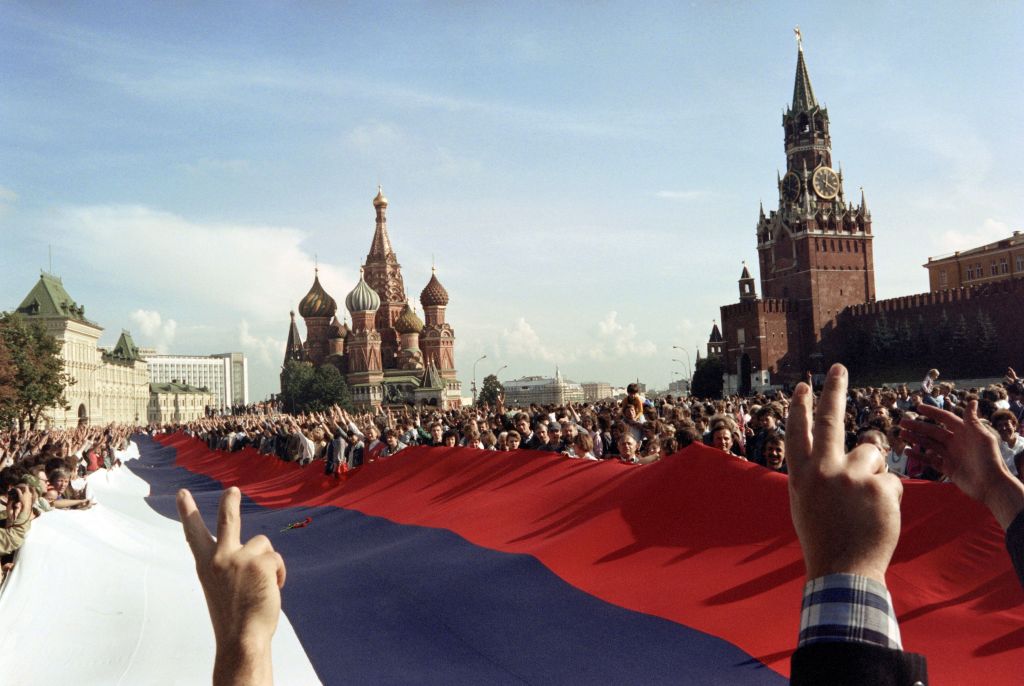In a quiet suburb of Moscow, a twenty-minute metro ride from the Kremlin, is the Soviet Union’s answer to Disneyland. Between a budget supermarket and a teacher training college is the Exhibition of Achievements of National Economy, known to locals by its Russian-language acronym, VDNKh. The ‘Kh’ is said like you are clearing your throat.
Every year, tens of thousands of visitors pass under the triumphal arch that stands at the entrance to the VDNKh. It looks like London’s Marble Arch and is topped with two gold-plated proletarians holding up a bundle of wheat. Past it, there’s stalls selling hot dogs, an imposing statue of Lenin, and a water fountain that plays out old Communist songs. The main attraction, though, is the horseshoe of pavilions around the park. There’s one for each of the former Soviet Republics. They show off the scale and diversity of the old empire. A wood-carved longhouse honours Karelian SSR. Armenia’s pavilion has a restaurant serving traditional grilled pork.
This is the ‘Russian world’ that Vladimir Putin wanted to unite when in the darkness of a February night he announced that he was invading Ukraine. At a pro-war rally soon after, a former Soviet pop star cheered on the conflict with a song saying Ukraine, Moldova, Lithuania and Estonia were part of their country. Former President Dmitry Medvedev, once seen as a liberal reformer, said that Kazakhstan never really existed without Russia. ‘Under Moscow’s indivisible hand, with the Slavic people at the head, we will proceed to the next campaign to restore our motherland’s borders, which, as you know, do not end anywhere.’ He later claimed that he had been hacked.
Many Russians haven’t got over the USSR. Putin, with Medvedev, Russia’s top military officers, the inner circle of the Kremlin and almost every visitor to VDNKh over the age of 30, was not only born in the Soviet Union, but unwillingly cast out of it when Communism collapsed in the 1990s. Russians prefer holidays in Turkey, western Europe or occupied Crimea. Very few have spent much time in the former Soviet Republics, and view the entire eastern Bloc as a grey, amorphous blob that’s quite like where they come from.
But in the three decades of uncompromising capitalism, grinding poverty, corruption and uncertainty that followed the Soviet Union’s collapse, people in the former republics got their own national identities. In Ukraine, the pro-western 2014 Maidan revolution, Moscow’s annexation of Crimea, and growing awareness of Stalin-era genocide and repression created a profound anti-Soviet feeling. Estonia, Latvia and Lithuania embraced their history of European integration, joining the EU and mostly putting the USSR in the past.
Central Asia, too, is no longer seen as some colonial backwater, it’s now a thriving destination located on the new Silk Road from China. Russians fleeing conscription in Kazakhstan have been told to learn the language of their hosts. They can’t just get by with their native tongue anymore. There’s the same expectation of Russian draft dodgers in Georgia, where even English is ironically seen as preferable to ‘colonial’ Russian, not least because Putin’s forces illegally occupy 20 per cent of Georgia.
Most Russians view the entire eastern Bloc as a grey, amorphous blob that’s quite like where they come from
In invading Ukraine, Russia’s hopes of reviving its superpower status was gambled away. ‘I thought Putin wanted to make Russia great, but he chose to destroy it,’ Russian nationalist commentator Oleg Kashin told me a few weeks after the declaration of war. The brutality of Putin’s failed efforts was on show to the world.
Russia’s once close partners, like Kazakhstan, are now pushing against the Kremlin. The Kazakh’s are refusing to accept Putin’s claims of sovereignty over eastern Ukraine, and aren’t to help avoid the economic sanctions put on his regime either. Kazakhstan is even offering its own energy exports to Europe as a replacement for Russian oil and gas. Emomali Rahmon, the president of nearby Tajikistan, went even further at a summit in October, demanding Putin ‘respect’ his counterparts in the former Soviet republics. ‘Not enough attention was paid to the small Republics, the small nations’, he said. Russia’s insistence on exploiting its former empire was one of the main causes of the Soviet collapse that Putin wants to reverse.
So Putin’s dreams of rebuilding the Russian world are over. Former Soviet states Azerbaijan and Armenia went to war this year despite Russia’s efforts to maintain the status quo ante. Hundreds of Tajik and Kyrgyz soldiers died in fighting over their border in September, just days after Russian troops were pulled out of their bases there and sent to Ukraine. Moldova, usually a close ally of the Kremlin, has filed a successful application to join the EU, while Turkey, China, Iran and the West are watching Moscow’s decline and want to strengthen their own hand.
As VDNKh staff polish the park’s ice-skating rink and wave off the crowds who came to see in the New Year, the sun finally seems to be going down on Russia’s once vast empire.







Comments